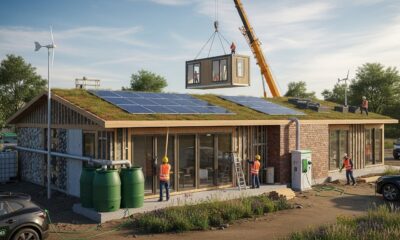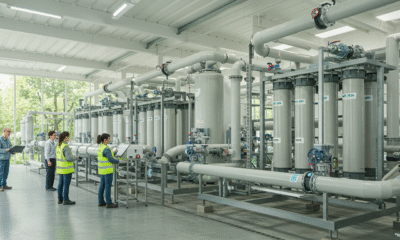

Features
How Construction Companies Can Ensure Sustainable Practices
There are a lot of things to bear in mind if you want to run a green business. Of course, the rules are going to depend on the type of business you operate.
More and more industries are going green. The construction industry is no exception. According to Fortune Business Insights, the market for eco-friendly building materials was worth $377 billion in 2022. It is likely to grow even more in the years to come.
Unfortunately, not all construction companies know how to become more sustainable. The good news is that the can make a lot of progress by following the guidelines below.
How Construction Companies Can Become More Sustainable in the Years to Come
The construction market is undoubtedly one of the most lucrative industries to invest in right now. After all, there are a lot of opportunities in the construction sector for making money.
According to Markets and Markets, as of 2020, the global construction market was valued at $6.4 trillion. This market is expected to reach a value of $14.4 trillion in 2030.
However, as urbanization continues to accelerate and resources become scarcer, construction companies must prioritize sustainability to ensure a resilient and prosperous future.
Here are a few key strategies that construction companies can adopt to enhance sustainability in their work:
Optimize Resource Efficiency
Before jumping into the main discussion, we must first ask an important question – what is sustainability? Ensuring sustainable development can mean a number of things. From committing to sustainable practices by using natural resources to ensuring environmental protection, everything is a part of ensuring sustainability.
According to Green Planet Hub, limiting practices to just environmental conservation alone isn’t enough to ensure sustainability. Sustainability also focuses on preserving and protecting our natural resources. Thus, whatever resource construction businesses use must be utilized efficiently.
Construction activities consume vast quantities of natural resources, including water, energy, and raw materials. To minimize waste and maximize resource efficiency, construction companies should implement strategies such as material recycling, waste reduction, and lean construction practices. By carefully planning construction processes, optimizing material use, and adopting modular construction techniques, companies can reduce construction waste and lower overall project costs.
Furthermore, incorporating sustainable building materials such as recycled steel, reclaimed wood, and low-impact concrete can further enhance resource efficiency and reduce environmental degradation.
Prioritize Renewable Energy
The construction industry contributes significantly to global greenhouse gas emissions. According to the United Nations Environment Programme, the construction sector accounted for around 37 percent of energy and process-related CO2 emissions in 2021.
To transition to a low-carbon economy, construction companies cannot but prioritize renewable energy sources like solar and geothermal power. Integrating renewable energy systems into construction projects will reduce carbon emissions and enhance energy independence and resilience. Besides, using energy-efficient technologies such as LED lighting, smart thermostats, etc, can further optimize energy use and minimize environmental impact.
Foster Stakeholder Collaboration
Sustainability in construction cannot be achieved in isolation. It requires collaboration and engagement with various stakeholders, including clients, suppliers, subcontractors, and local communities. By fostering open communication and collaboration throughout the project lifecycle, construction companies can align objectives, identify synergies, and address sustainability challenges effectively.
Engaging stakeholders early in the planning process allows for the integration of diverse perspectives and expertise, leading to more innovative and sustainable solutions. Moreover, involving local communities in decision-making processes and prioritizing social sustainability initiatives can build trust, enhance project outcomes, and create shared value.
Additionally, forging partnerships with sustainable suppliers and subcontractors can ensure the use of eco-friendly materials and practices throughout the supply chain. Such stakeholder collaboration can leverage collective expertise and resources to achieve shared sustainability goals.
Invest in Green Technology and Innovation
According to Fortune Business Insights, the global green technology and sustainability market is worth $16.50 billion as of 2023. The rapid advancement of such technology offers unprecedented opportunities for enhancing sustainability in construction.
From building information modeling (BIM) software to 3D printing and modular construction techniques, innovative technologies can revolutionize the way buildings are designed and constructed. By investing in green technology and innovation, construction companies can streamline processes, improve efficiency, and reduce environmental impact. For example, BIM technology enables collaborative design and visualization, optimizing building performance and minimizing material waste.
Furthermore, embracing prefabrication and modular construction techniques can accelerate project timelines, reduce construction waste, and enhance quality control. By staying abreast of emerging technologies and adopting those that promote sustainability, construction companies can lead the transition to a more sustainable built environment.
Promote Environmental Stewardship and Education
Construction companies can promote sustainability by fostering environmental stewardship and education within their organizations and the broader community. Through training and education programs on sustainable practices, companies can empower employees to integrate environmental considerations into their daily work.
Moreover, engaging in educational initiatives with universities and local organizations can raise awareness about the importance of sustainability in construction. It can also inspire future generations of construction industry professionals.
In conclusion, sustainability is not a choice but a necessity for the construction industry to thrive in the face of environmental challenges. By embracing these practices, construction companies can play a transformative role in building a sustainable future. Through collective action, the construction industry can pave the way for a more resilient, equitable, and environmentally conscious built environment for generations to come.


 Environment12 months ago
Environment12 months agoAre Polymer Banknotes: an Eco-Friendly Trend or a Groundswell?

 Features11 months ago
Features11 months agoEco-Friendly Cryptocurrencies: Sustainable Investment Choices

 Features12 months ago
Features12 months agoEco-Friendly Crypto Traders Must Find the Right Exchange

 Energy11 months ago
Energy11 months agoThe Growing Role of Solar Panels in Ireland’s Energy Future



























